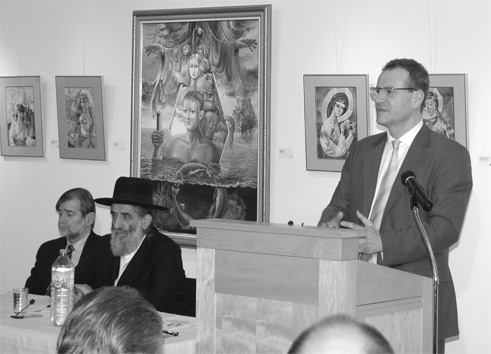
Jewish – Ukrainian
Relations Show Promise in Understanding
By
John Pidkowich
In building better understanding and mutual
respect between Jews and Ukrainians, a positive step forward was an engaging
evening talk and discussion conducted with Toronto’s Ukrainian community on
April 8 at KUMF Gallery. Entitled “The Importance of Jewish-Ukrainian
Relations”, talk presenters gave personal testimony about the Jewish community
in 
A strong beacon to
developing Jewish - Ukrainian relations,
Mr. Sheykhet grew up
speaking Ukrainian which his mother spoke and he considers Ukrainian to be his
2nd Mother language, Yiddish being his first. Ukrainian was the
common language to understand and respect each other. To his Ukrainian
students, he would lecture in Ukrainian, for whom he felt sorry for as the
Ukrainian language was forbidden at the time. He also wrote books on what it
means to be Jewish and distributed them among friends not fearing the Soviet
system and persecution.
In relations with
Ukrainians, Mr. Sheykhet became close with writer Iryna Kalynets, the late
historian Prof. Yaroslav Dashkevich and with many Ukrainian nationalists. He
understood their ambition to rebuild Ukrainian independence and with many in
the Jewish community supported the referendum for independence. He also stated
that the biggest Jewish support for independence was that for the Orange
Revolution which he still perceives as a big victory for the Ukrainian people.
Otherwise,
Aside from a mistrustful
relationship with the current parliament Verkhovna Rada and the bureaucracy,
Mr. Sheykhet stated that the Jewish community’s communication with the majority
of the Ukrainian people is good. Travelling the Ukrainian countryside and
hearing first-hand accounts from old villagers, on how side-by-side with Jews,
they used to help each other living in peace and harmony. Particularly,
mountain villagers and their communication with nature, spoke to him with an
original truth from the heart claiming that “the Nazi’s started with the Jews
and finished with Ukrainians”.
In reflection, Mr. Sheykhet
said Jews and Ukrainians have to find a way to live together today. In
understanding negative beliefs held by each, their inspiration is centred
around “Third Forces” which have nothing in common with Jewish and Ukrainian
relations. For example, the Interregional Academy of Personnel Management (MAUP),
the largest non-state higher education institution in
When Mr. Sheykhet comes to a
place to restore sacred sites of Jews, and Ukrainians come over to say “thank
you” for doing the right thing, this inspires him to continue to return dignity
to Jewish cemeteries, mostly with great effort under adverse conditions. Even
where Jewish cemeteries have become privatised by former Communists as their
own yards, Mr. Sheykhet stated that Ukrainians would not build/develop their
properties atop of graves, “it’s not their style!” While appeal to Ukraine’s
court system, which is completely corrupt, results in denial of claims for
Jewish sacred sites, Ukrainians are at the same time accused of inhuman acts.
He has stated that this is not true – these are actions of the bureaucracy and
not the majority of the Ukrainians. Mr. Sheykhet's organization decided to
bring an international voice to such an unacceptable situation, thinking that
the former communists ruling
To be taken possibly as a
challenge, Mr. Sheykhet boldly asked “How would Ukrainian people better
understand their position historically?” During World War II, both Jewish and
Ukrainian people suffered at the hands of
Nearing the end of the
presentations, Iryna Korpan, host of OMNI TV's Ukrainian program “Svitohliad”,
spoke about family recollections of her maternal Grandmother Kateryna Sikorska
who hid three Jewish men in her home in Pidhaytsi,
A question and answer
session was followed by a reception.
PHOTO
From L. to R.: Mark
Freiman, Meylakh Sheykhet, Borys Wrzesnewskyj, Liberal MP